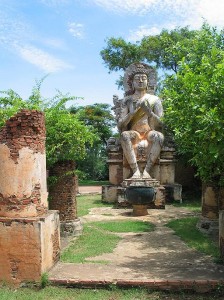The relation of life to death, what happens after the end, what we do with the years we have and what we leave behind, remains perhaps the most consistently affecting and important issue plaguing human life. Religions throughout the ages have sought to answer the unanswerable questions death inspires, and, more recently, science has sought to do the same. Traditional Western approaches to the issue, such as through Christianity and the belief in an eternal afterlife in heaven or hell, or through science, where there is no consciousness at all after the final moments. We live and we die, and death serves as the ultimate and universal terminace, the separator either between nothingness or the eternal beyond. Eastern religions such as Buddhism, however, embrace something of a middle ground, where the actions we take during our life can hold consequences for those around us, and indeed for ourselves, for years and centuries to come.
Of course, religions of all kinds are hugely complex, and it is very difficult to summarize their lessons and beliefs. One popular misconception of Buddhism is the belief in reincarnation. In fact, reincarnation does not appear anywhere in the 84,000 “teachings” ascribed to the Buddha. Buddhists do not believe that human beings have a material soul, like Christians do, that is, a life force within us that lives on after our death. They focus rather on the concept of karma, a universal life force that connects us all, so that a person’s good or bad actions can affect those on the other side of the world, and can, correspondingly, come back to the actor as well as the world changes around them as the result of their actions. There are six realms of existence in Buddhism that correspond to the individual’s level of enlightenment, and when that person dies, their level of enlightenment will endure through their universal karma. In Buddhism, death is a part of karma, of cause and effect and overall existence, and those who had an especially great effect on karma will live on after death, in the ripple effects of their karma. This is not reincarnation, in fact it is something closer to universal memory, unaccountable and all-encompassing.
While this may seem a radically different way of looking at death, there are almost as many similarities with our conception of Christianity, and indeed atheistic science, as there are differences. All of these philosophies hold that death is not the end. In Christianity, there is the possibility of the after-life, largely determined by the righteousness of the life lived — in Buddhism, life too affects existence after death, and men are encouraged to live righteous lives as well so that they might have a greater positive impact on universal karma. Even scientific thought, and psychological philosophers such as Freud and Ernest Becker, see merit in the concept of life after death, because, of course, every death leads only to further life, as their biological matter is re-absorbed and re-distributed into the natural environment around us. All of us like to think that death is not the end, even if we do not believe in a god or subscribe to a religion — perhaps we will live on through our family, a legacy left behind or accomplishments achieved. The concept brings us comfort.

Buddha was a spiritual teacher, born in India, who is supposed to have left some 84,000 teachings on life and death behind — Image courtesy of WikiMedia Commons, photo by Laszlo Ilyes
So, while religious philosophies have unified and divided us since time immemorial, they can also serve to bring us together, even on opposite sides of the world. Even in lives wholly different from our own, we humans can’t seem to help but contemplate these issues and come up with the answers that work best for us, we being nothing more than the flawed, troubled and curious people that we are, everywhere.
- Read more about 20th Century psychologist Ernest Becker’s take on life after death in our review of his work, The Denial of Death
- Learn about the unique funeral practices of some Buddhist believers
- Unlock the truth behind Dia de Los Muertos, Mexican Day of the Dead

 Buddhism and the Eastern Middle Ground
Buddhism and the Eastern Middle Ground



 Recovering Cremation Remains After the Los Angeles Fires
Recovering Cremation Remains After the Los Angeles Fires
 “As Tears Go By” by Marianne Faithfull
“As Tears Go By” by Marianne Faithfull
 “The Sea” by John Banville
“The Sea” by John Banville














